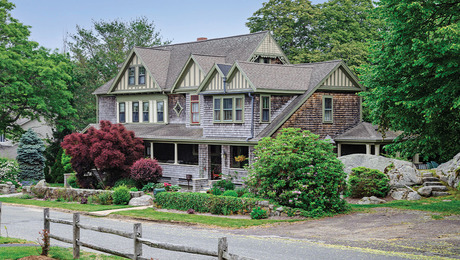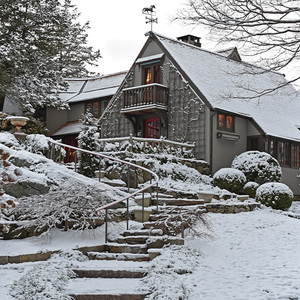I’m currently collecting bids for putting pavers on my driveway (currently dirt). The driveway is 85 feet long and 10 feet wide and slopes about 10 feet from top to bottom. Are there any concerns I should have with pavers on a slope?
Also, my first, and so far only proposal calls for 8″ of roadbase, 1″ of sand and 6cm pavers. There is no landscaping fabric mentioned. Should this be included to prevent weeds from working through. I’ve seen pavers in 8cm as well. Should I consider a thicker paver? Will it make a difference?
Finally, the contractor added a line item for running the three downspouts that empty on the driveway into an underground drain to avoid them from emptying onto the paver driveway. Is this a good item that I should give serious consideration to? How should the end of the drain at the end of the driveway? I don’t have a storm drain so I can’t see where it would end.
Thanks for the help.
Seth















Replies
Seth,
I'm happier than a pig in poop with my paver drive, patio, sidewalks, pool deck, etc. Most is relatively flat, but some areas such as the driveway are on a slope.
Obviously the base preparation is a major issue. Compaction of such cannot be over done. In my experience, I question the simple use of one of those flat vibrating things about the size and shape of a lawnmower. Those will provide the flattest compacted area, but not necessarily the most compacted area. I assume your contractors will provide some workmanship warranty should there be further settling a year or two later - especially on the drive where your cars will be focusing further compaction.
The underground drain issue does prove your contractor has experience. The biggest problem you'll have subsequent to the installation will be rains or other water causing the sand between the pavers to be washed out. Gutter drains spilling onto them will magnify the effect. Resolve this underground drain issue before you go much further. It has to go to daylight somewhere. Is there a drain ditch close by where drainage normally goes? Tie in all sources of surface water nearby to these drains.
The sand issue will still be around even if you do use the underground system. Something else has to be used to retain said sand and seal the pavers. In my case, I was able to find a dealer to provide me with a silicon rubber based sealant called "Professional Water Sealant." This is applied on the pavers after the sand has been brushed on and the pavers recompacted. More sand is added to completely fill all cracks. Then this juice is applied using a tank type sprayer (use proper masks, this stuff contains Tetrachloroethylene and mineral spirits) allowing the excess to flow into the sand joints. After curing, this material essentially encases the sand particles in a silicon caulk like material. Normal rains and moisture will not wash it out. However, the use of a water spray directed towards the cracks will cause it to flush out. Therefore you'll want to keep the power washer away as well as the hard spray from the garden hose.
This material also penetrates the pavers preventing spills from oils and such from staining them. Oil drops as well as water will simply bead up and roll away.
To find a dealer close to you, call the manufacturer (Professional Products of Kansas) at 800-676-7346. I'm sure they could fax you a MSDS as well as application instructions. The stuff is not cheap. I paid $50 per gallon for the regular strength product. It comes in one and 5 gallon cans. I found that one gallon will cover about 100 square feet done in two coats. The first coat will take up more than the second. Of course, your pavers may be more or less porous.
Finally, choose pavers that nicely compliment the architecture of your home. Some look cheap. I used tumbled pavers and installed them in a herringbone pattern.
As far as thickness, 8cm is a bit more than 3 inches. That's fairly thick. Mine were about 2.25 inches thick and I haven't had any cracks in two years.
Best of luck. I believe these make superior hardscapes as opposed to plain concrete. But - do you live in a snow area? I've heard those people have troubles shoveling snow due to minor irregularities in the surface as well as snow accumulating in the cracks between pavers.
Seth, stonefever & your contractor are right about the drain to pick up the downspouts; you don't want the water on the pavers.
I haven't used the coating mentioned, so don't know about that. Seems like a good idea, but is not essential. We don't coat our work, and very few of my clients do any sort of coating after we're done. The few who have, find they need to repeat often.
Depending on your climate, I might like to see more base. We use 10-12" for a driveway, but we are in snow country and have many freeze-thaw cycles per winter. If you are in the south, 8" might be fine. It should be brought up in thin layers and tamped repeatedly.
6cm pavers are fine, even for a driveway. The thicker ones are used mostly for industrial and municipal applications.
Re fabric: Contrary to many articles and some books, fabric or plastic will not do anything to stop weed growth! After the excavation and all that base work, there are no weeds. Any weeds that develop in the cracks are invariably from airborne seeds that later germinated and grew. Fabric does have a use, though. If you have wet clay or other squishy conditions, fabric can be used under the base material to help stabilize it and prevent the stone from disappearing into the goo. We use it only when needed, and is not ordinarily specified.
Done right, you will love your pavers! Good luck finding the right contractor.
Bear
Thanks Stonefever and Bear. You've given great advise and it's appreciated.
I live in Boulder, Colorado so snow and freeze are certainly an issue. I will ask my contractor about base material thickness for this area as well as snow and paver styles that might work well to deal with the issue. I feel somewhat limited in style as the house is an 1890s Victorian and many of the locking styles are very modern looking. Our local manufacturer is Pavestone. I'm considering using their Plaza style stone, http://www.pavestone.com/commercial/paver_plaza1.html , basically tumbled sqaures and rectangles, in a muster-k pattern and simply rectangular border. Or possibly a tumbled Holland brick style in a herringbone, http://www.pavestone.com/commercial/paver_herit_holland.html.
I'm going to look into the sealing idea and ask the contractors as well. The contractor to provide a quote so far does pavers and only pavers for 14 years so I'm confident in his ability and warranty. I would like to compare for cost as you can imagine that a 10' x 80' paver driveway ain't cheap! So far it's looking like between $8.50 and $9.50 a square foot . . . ouch.
Thanks again for your info.
Best,
Seth
Edited 3/27/2002 8:17:33 AM ET by Seth Frankel
Seth, I'm not in your area, but that seems to be a reasonable price range for that size project , especially for a tumbled paver.
Experience of the contractor and your confidence in him are more important than saving a few bucks. 5-10 years from now any savings will be forgotten, but a quality installation will still bring satisfaction, and a poor job will still bring disappointment.
I'd ask about increasing the base depth a little, though. Gravel is not the expensive part of doing this, but it is very important. Bear
One of the biggest advantages of using pavers is that they allow stormwater to infiltrate into the ground instead of simply running off. Stormwater runnoff is a major source of water pollution and contributes to flooding. Running your roof drains underground to some sort of drywell is a great idea. If you seal up the driveway after installing pavers however you will prevent any infiltration. There are pavers available now which facilitate this process by having built in gaps between each one. You can fill the gaps and cracks with rock dust which is less prone to washing out. You can also grow grass in the spaces - but then of course you have more to mow. Good luck with your project.
Seth -- go to http://www.washingtonpost.com/wp-dyn/articles/A17840-2002Mar26.html
there is an excellent article on using pavers for patios -- they all talk 4 inch base and $15 a sf -- your base and cost all seem reasonable.